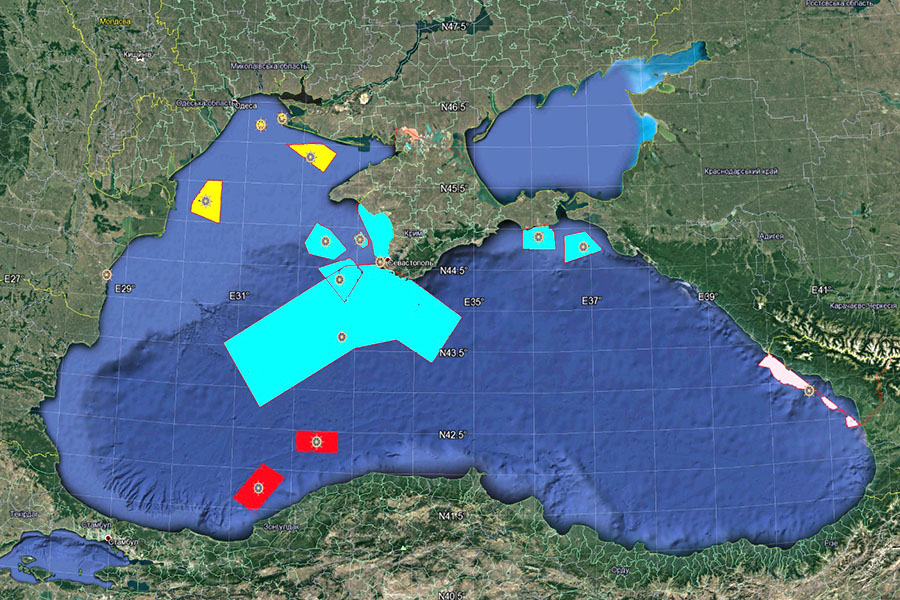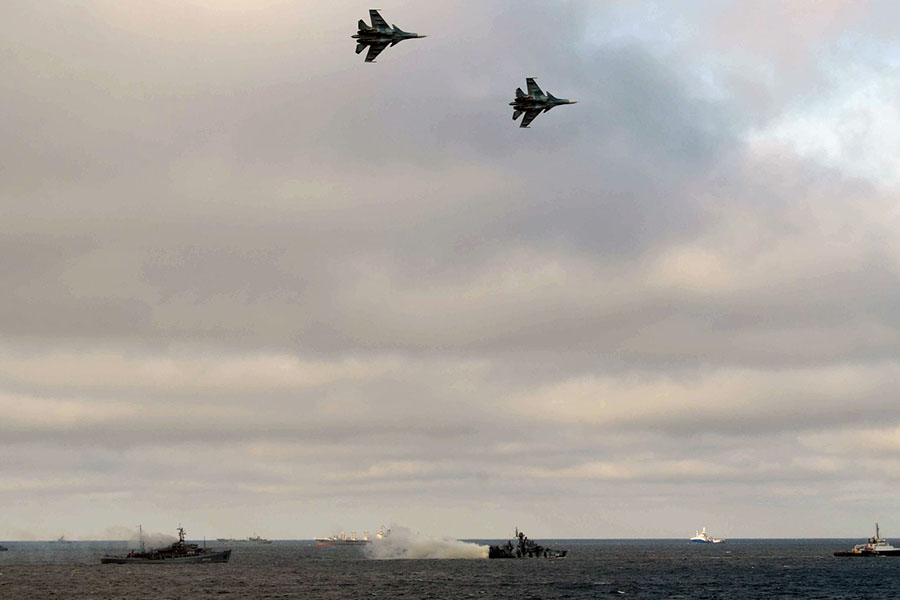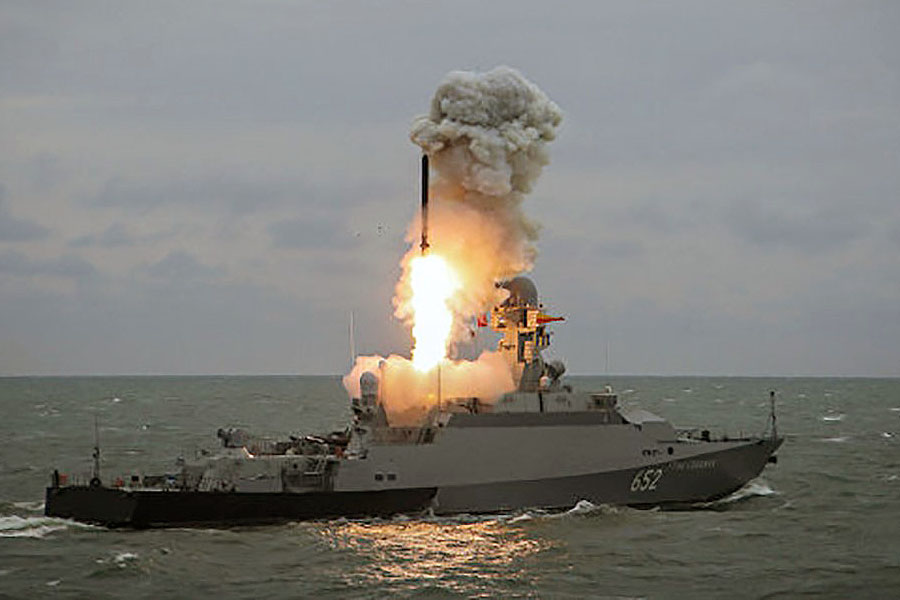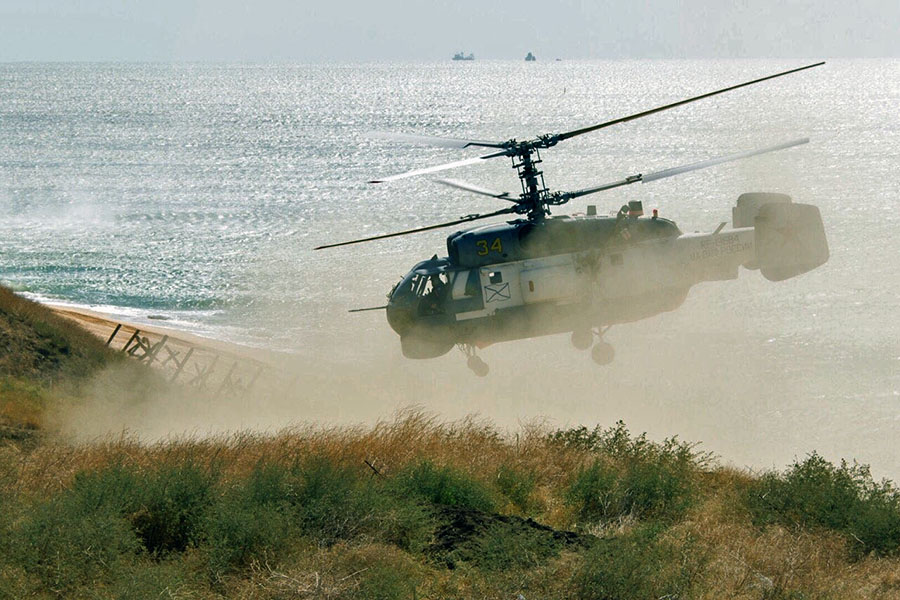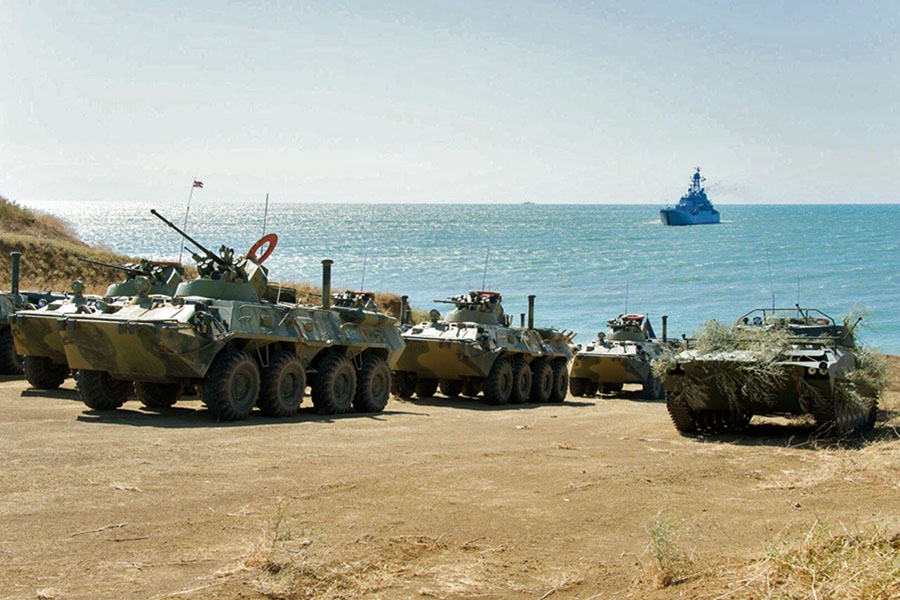The Issue of Legality of the Foreign Naval Military Drills Within Ukraine's Exclusive Economic Zone
Closure of the Black Sea for Putin's naval trainings in January, 2020: Ukrainian naval forces in yellow, Turkish naval forces in red, Bulgarian naval forces in pink, Russian Black Sea fleet in turquoise.
Bohdan USTYMENKO,
M.J., Attorney at Law
In UN General Assembly Resolution 74/17 of December 9, 2019, The Problem of the militarization of the Autonomous Republic of Crimea and the City of Sevastopol, Ukraine, as well as parts of the Black Sea and the Sea of Azov [1] the General Assembly,
among other things, called on the Russian Federation to abstain from actions that impede the legitimate exercise of navigational rights and freedoms in the Black and Azov Seas and the Kerch Strait, including, inter alia, the closure of naval areas under the pretext of military exercises,
in accordance with international law, including the provisions of the 1982 United Nations Convention on the Law of the Sea [2] (UNCLOS).
BSNews Editor-in-Chief Andrii Klymenko stated in his article that
“…The combined area the Black Sea regions blocked by the Russian Navy in July 2019 alone was way over 120 thousand square kilometers, or more than ¼ of the total Black Sea area. The purpose of such actions is to form a "habitual" perception that the entire Black Sea is a Russian zone of influence. This is the essence of Russia's strategy for squeezing NATO out of the Black Sea...”.
Klymenko also concludes that “…In 2020, one of the Russian methods of obstruction navigation in the Black Sea will be expansion of the practice of shutting the western regions of the sea for navigation under the pretext of conducting live-fire drills, whether real or make-believe…".
So, Ukraine should be prepared for the intensive foreign navy military live-fire drills within its own EEZ.
Something on Legal Status
Training of the Black Sea Fleet, January 2020. Photo: http://kremlin.ru
But before considering the legal aspects of foreign naval drills within the exclusive economic zone of Ukraine, we should first remember the legal status of both the EEZ and a warship.
* * *
Under Article 55 of the UNCLOS, the EEZ is an area located beyond the border of the territorial sea and adjacent to it. The width of the EEZ should not extend beyond 200 nautical miles from the baselines from which the breadth of the territorial sea of the coastal state is measured.
Such area is subject to a special UNCLOS legal regime under which the rights and jurisdiction of a coastal state and the rights and freedoms of other states are governed by the relevant provisions of UNCLOS.
Namely, in the exclusive economic zone, the coastal State has:
(a) sovereign rights for the purpose of exploring and exploiting, conserving and managing the natural resources - whether living or non-living - of the waters superjacent to the seabed and of the seabed and its subsoil, and with regard to other activities for the economic exploitation and exploration of the zone, such as the production of energy from the water, currents and winds;
(b) jurisdiction with regard to:
(i) the creation and use of artificial islands, installations and structures;
(ii) marine scientific research;
(iii) the protection and preservation of the marine environment;
(c) other rights and duties under UNCLOS (Article 56, paragraph 1, UNCLOS).
Meanwhile, paragraph 2, Article 56 UNCLOS establishes that in exercising its rights and performing its duties under the UNCLOS in the exclusive economic zone, the coastal state shall have due regard to the rights and duties of other states and shall act in a manner compatible with the provisions of the UNCLOS.
In the exclusive economic zone, all states, whether coastal or land-locked, enjoy, subject to the relevant provisions of the Convention, the freedoms referred to in Article 87
of navigation and overflight and of the laying of submarine cables and pipelines, and other internationally lawful uses of the sea related to these freedoms, such as those associated with the operation of ships, aircraft and submarine cables and pipelines, and compatible with the other provisions of the UNCLOS. (Article 58, (1).
Furthermore, UNCLOS Article 58 (3) states that in exercising their rights and performing their duties under the Convention in the exclusive economic zone, states shall have due regard to the rights and duties of the coastal state and comply with the laws and regulations adopted by the coastal state in accordance with the provisions of the UNCLOS and other norms of international law.
The Black Sea Fleet exercises with Caliber missile launches
Therefore, one must consider the provisions of the Ukrainian law.
In accordance with Article 4 of the Law of Ukraine On the Exclusive (Marine) Economic Zone of Ukraine [3] (hereinafter -- the Law on EEZ), in its exclusive (maritime) economic zone Ukraine has:
a) sovereign rights for the exploration, exploitation and conservation of living and non-living natural resources in the waters superjacent to the seabed, the seabed itself and its subsoil, as well as for other activities related to the economic exploitation and exploration of the zone, such as the production of energy from the water, currents and winds
b) jurisdiction provided for by the relevant provisions of this Law and the rules of international law for the creation and use of artificial islands, installations and structures, the conduct of marine scientific research and the protection and conservation of the marine environment
c) other rights stipulated by this Law, other legislative acts of Ukraine and the generally recognized norms of international law.
The sovereign rights and jurisdiction of Ukraine regarding the EEZ seabed and its subsoil must be implemented in accordance with the legislation of Ukraine on the continental shelf and the Subsoil Code of Ukraine.
At the same time, in exercising its rights and fulfilling its obligations in the EEZ, Ukraine takes due account of the rights and obligations of other states.
Within the EEZ of Ukraine, all states, both coastal and landlocked, granted their compliance with the provisions of this Law, other acts of Ukrainian legislation and the generally recognized rules of international law, enjoy the freedom of navigation and flights, laying of submarine cables and pipelines and other uses of maritime space legitimate under the international law (Article 6, Part 2 of the Law on the EEZ).
Training of the Black Sea Fleet with landing at the Opuk training area (Feodosia, occupied Crimea)
However, currently, the EEZ Law has only one norm concerning the national security.
And even that provision is merely declarative. Namely, Part 1 of Article 11 of the EEZ Law provides that within its EEZ, Ukraine has exclusive jurisdiction over artificial islands, installations and structures, including customs, tax, sanitary and immigration laws and regulations, as well as laws and regulations pertaining to its security.
That is, laws and rules regarding the security of Ukraine within its EEZ are the exclusive jurisdiction of our state.
Unfortunately, though, the Law does not contain any provisions that would regulate weapon exercises by foreign warships in the domestic EEZ.
The issue is also not regulated by Article 411 of the Economic Code of Ukraine titled Exclusive (Maritime) Economic Zone of Ukraine [4].
Training of the Black Sea Fleet with landing at the Opuk training area (Feodosia, occupied Crimea)
Besides, the following should be noted in regard to a warship’s legal status.
For the purposes of UNCLOS, a warship is a ship
- belonging to the armed forces of a state bearing the external marks distinguishing such ships of its nationality,
- under the command of an officer duly commissioned by the government of the state and whose name appears in the appropriate service list or its equivalent,
- and manned by a crew who are under regular naval discipline.
In general, according to UNCLOS, in the EEZ, warships are immune from the jurisdiction of any state other than the flag state.
However, the flag state carries international liability for any damage or loss caused to the coastal state by a warship’s failure to comply with the laws and regulations of the coastal state regarding passage through its territorial sea, UNCLOS provisions or other international law norms (Article 31 UNCLOS).
A perfect example of such failure is the existing ongoing confrontation between Ukraine and the RF due to the Russian naval fire drills and exercises in the Ukrainian EEZ that Ukraine has not agreed to.
Thus, in accordance with the Federal Law On Ratification of the United Nations Convention on the Law of the Sea and the Agreement on the Implementation of Part XI of the United Nations Convention on the Law of the Sea [5]
the Russian Federation ratified UNCLOS and the Agreement of July 29, 1994 on the implementation of Part XI UNCLOS and, inter alia, stated that it did not adopt the procedures provided for in section 2 of Part XV of the said Convention leading to binding decisions on military disputes between the Parties.
In turn, Ukraine has also ratified UNCLOS in accordance with the Law of Ukraine On the Ratification of the 1982 United Nations Convention on the Law of the Sea and the Agreement on the Implementation of Part XI of the United Nations Convention on the Law of the Sea 1982 [6] that contains a statement that, unless otherwise provided for in separate international treaties between Ukraine and the relevant states,
Ukraine does not recognize mandatory procedures leading to binding decisions for the settlement of disputes concerning military activity. Moreover, there has been no separate agreement between Ukraine and the Russian Federation that would provide for certain mandatory procedures for the consideration of disputes between them regarding military activity.
Therefore, by exercising the rights conferred by UNCLOS Article 298, Ukraine and the Russian Federation have made statements aimed at avoiding binding procedures that entail binding decisions on disputes in regard to any military activity.
In other words, courts and arbitral tribunals have no jurisdiction to hear disputes between Ukraine and the Russian Federation over the above case category.
Putin at the Black Sea Fleet training, January, 2020. Photo: http://kremlin.ru
It should also be noted that the protection of Ukraine's sovereign rights in its exclusive economic zone and control over the exercise of rights and obligations by other states, as well as Ukrainian and foreign legal and natural persons and international organizations is one of the main functions of the State Border Guard Service of Ukraine (hereinafter — SBGS) according to part one of Article 2 of the Law of Ukraine On State Border Service of Ukraine [7] (hereinafter — SBGS Law).
The Law of Ukraine On National Security of Ukraine [8] stipulates that the SBGS is a special purpose law enforcement agency (Part 6, Article 18 of this Law).
The rights of the SBGS, as defined in paragraph 26, section 1, Article 20 of the SBGS Law, include
the right to stop or suspend fishing, marine scientific research and other works in the territorial sea, adjacent zone, exclusive (maritime) economic zone and inland waters of Ukraine in the absence of a respective permit (approval) or violation of their implementation rules established by law.
The use of physical force, special and regular weapons and military equipment by the SBGS personnel is provided for by Article 21 of the SBGS Law.
Additionally, in accordance with section 4, Article 1 of the Law of Ukraine On the Armed Forces of Ukraine [9] (hereinafter — the Law on the Armed Forces), the divisions, units and regiments of the Armed Forces of Ukraine (hereinafter — the Armed Forces) may be involved in the protection of Ukraine's sovereign rights in its exclusive (marine) economic zone and on the continental shelf, as well as in the relevant legal procedures.
As defined in section 2, Article 1-1 of the Law on the Armed Forces, while engaged in the tasks of protecting the state border and sovereign rights of Ukraine in its exclusive economic zone, the military units, regiments and servicemen of the Armed Forces have the right to store and use military and special equipment and weapons in the manner and under circumstances stipulated in Article 21 of the Law on the SBGS.
The use of weapons and military equipment is permitted in the event when other measures have proved ineffective or if such measures are impossible.
In addition, the Air Code of Ukraine [10] establishes that,
together with the Armed Forces, in accordance with the national priorities, the SBGS is granted the priority right to use Ukraine's airspace to repel an air attack on the territory of Ukraine or to prevent and stop violations of the state border and sovereign rights of Ukraine in its exclusive (marine) economic zone, (section 2, Article 24 of the Code).
Thus, the current national security legislation designates a specific law enforcement agency, namely the State Border Guard Service of Ukraine, for the protection of Ukraine's sovereign rights in its EEZ and control over the exercise of the relevant rights and obligations there by other states.
The law also stipulates that the Armed Forces of Ukraine may be involved in the tasks of strengthening the protection of Ukraine's sovereign rights as well.
Obviously though, the use of weapons and military equipment for ending the military activity of foreign warships within the exclusive economic zone of Ukraine is the last resort.
Meanwhile, unauthorized weapon drills and exercises by foreign warships within Ukraine’s EEZ may impair the exercise of our country's sovereign rights and its jurisdiction, causing losses. For instance, Ukraine’s exploration, development and storage of natural resources — both living and non-living — within the boundaries of the EEZ may have to be suspended as a result of the foreign military activity.
Additionally, live fire drills in the Ukrainian EEZ without Ukraine’s prior approval or permit can lead to damage or destruction of artificial islands, installations, structures and vessels, and even to human casualties.
In view of the above, it seems expedient
to revise the Law of Ukraine On the Exclusive (Marine) Economic Zone of Ukraine so that, among other things, it establishes the procedure for granting Ukrainian permits for military activities, including weapon exercises, as well as research and hydrographic surveys by foreign warships within the exclusive economic zone of Ukraine,
and inform the United Nations, all states of the world and other international legal entities of the new order.
References:
1. Problem of the militarization of the Autonomous Republic of Crimea and the city of Sevastopol, Ukraine, as well as parts of the Black Sea and the Sea of Azov: resolution 74/17 by the UNGA from December 9, 2019 (the 74th session Agenda item 31 (a) Prevention of armed conflict.
URL: https://digitallibrary.un.org/record/3841716?ln=ru
2. United Nations Convention on the Law of the Sea from December 10, 1982 ratified by the Law of Ukraine Pro ratyfikatsiiu Konventsii Organizatsii Obyednanykh Natsiy z vorskogo prava 1982 roku ta Ugody pro implementatsiyu Chastyny XI Konventsii Organizatsii Obyednanykh Natsiy z morskogo prava 1982 roku #728-XIV from June 3, 1999 [On Ratification of the 1982 United Nations Convention on the Law of the Sea and the Agreement Relating to the Implementation of Part XI of the 1982 United Nations Convention on the Law of the Sea]. URL: https://zakon.rada.gov.ua/laws/show/995_057
3. Pro vyklyuchnu (morsku) economichnu zonu: Zakon Ukrainy vid 16.05.1995 r. [On the Exclusive (Marine) Economic Zone of Ukraine: Law of Ukraine from May 16, 1995]. URL: https://zakon.rada.gov.ua/laws/show/162/95-вр
4. Hospodarskyi kodeks Ukrainy vid 16.01.2003 r./ Verkhovna Rada Ukrainy. Ofitsiinyi visnyk Ukrainy. [The Economic Code of Ukraine from January 16, 2003. The Official Bulletin of Ukraine #11 (2003)], p. 303, paragraph 462.
5. O ratifikatsii Konventsii Organizatsii Obyedinyonnykh Natsii po morskovy pravu i Soglasheniya ob osushestvlenii chasti XI Konventsii Organizatsi Obyedinyonnykh Natsii po morskovy pravu: Federalnyi zakon ot 26.02.1997 g #30-FZ [On Ratification of the United Nations Convention on the Law of the Sea and the Agreement Relating to the Implementation of Part XI of the United Nations Convention on the Law of the Sea: Federal Law #№ 30-FZ from February 26, 1997]. URL: www.kremlin.ru/acts/bank/10594
6. Pro ratifikatsiyu Konventsii Organizatsii Obyednanykh Natsiy z morskogo prava 1982 roku #728-XIV from June 3, 1999 [On Ratification of the 1982 United Nations Convention on the Law of the Sea and the Agreement Relating to the Implementation of Part XI of the 1982 United Nations Convention on the Law of the Sea].
URL: https://zakon.rada.gov.ua/laws/show/728-14
7. Pro Derzhavnu prykordonnu sluzhbu Ukrainy: Zakon Ukrainy vid 03.04.2003 r. [On State Border Service of Ukraine: Law of Ukraine from April 3, 2003].
URL: https://zakon.rada.gov.ua/laws/show/661-15
8. Pro natsionalnu bezpeku Ukrainy: Zakon Ukrainy vid 21.06.2018 r. [On National Security of Ukraine: Law of Ukraine from June 21, 2018].
URL: https://zakon.rada.gov.ua/laws/show/2469-19
9. Pro Zbroyni Syly Ukrainy: Zakon Ukrainy vid 06.12.1991 r. [On the Armed Forces of Ukraine: Law of Ukraine from December 6, 1991].
URL: https://zakon.rada.gov.ua/laws/show/1934-12
10.Povitryanyi kodeks Ukrainy vid 19.05.2011 r. [Air Code of Ukraine from May 19, 2011].
URL: https://zakon.rada.gov.ua/laws/show/3393-17
* * *
 This publication has been produced with the support of the European Endowment for Democracy (EED). Its contents do not necessarily reflect the official opinion of EED. Responsibility for the information and views expressed in this publication lies entirely with the authors.
This publication has been produced with the support of the European Endowment for Democracy (EED). Its contents do not necessarily reflect the official opinion of EED. Responsibility for the information and views expressed in this publication lies entirely with the authors.
